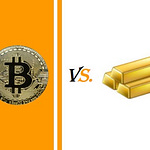Dear Readers,
Humanity has had a variety of different monies over the years, like shells, livestock, precious metals, and more. But each of them eventually fell out of favor when societies found better money.
Perhaps no money in history has been as unfavorable as fiat. Fiat currencies, which are typically issued and controlled by governments and their cronies, have enabled various misdeeds against society at large:
Fiat enables theft via inflationary money printing, destroying wealth and people’s ability to save.
Fiat inflation incentivizes ever-increasing amounts of debt for governments, businesses, and individuals.
Fiat financial systems are highly susceptible to confiscation, surveillance, censorship, and burdensome taxation.
Many projects in the “Crypto” space have billed themselves as a cure for the evils perpetrated through fiat currencies. But as we’ll see today, fiat and “Crypto” are not quite as different from one another as we’ve been led to believe.
“Crypto” And Fiat Are Alike In More Ways Than One
One advantage that historical monies had over today’s fiat currencies is that they were typically free of control by any one party: Anyone could dive for shells, anyone could raise livestock, and gold was often acceptable as payment whether or not it had a monarch’s face imprinted on it.
Fiat currencies are of course completely controlled by the governments that issue them. Those governments decide when to increase supply or when to remove certain denominations from circulation. They decide who can access the money and how it can be spent.
If “Crypto” truly is different from fiat, then we should expect it to be relatively resistant to centralized control like monies in the past were, right?
It seems like that may not be the case. Every token within the “Crypto” space has a central team or group that decides what the token’s supply will be, how the token can be used, and who can use it. For example:
There are cryptocurrencies with foundations and corporations deciding how “treasuries” will be spent or when portions of the supply will be burned.
There are cryptocurrencies issued by Central Banks that can be programmed to only be spent for certain goods and services and only within specific timeframes.
There are cryptocurrencies where the majority of nodes will refuse to process transactions unless certain conditions are met, such as adherence to government regulators like the Office of Foreign Assets Control (OFAC) within the U.S.
Fiat money is defined as a type of currency that derives its value from government decrees. But if “Crypto” is full of tokens with value that is manipulated by centralized teams that are all susceptible to government oversight and coercion, does that mean that “Crypto” is fiat too?
Bitcoin Is Not Fiat
We can’t really end a discussion like this without diving a bit into the unique characteristics that set Bitcoin apart from both fiat and “Crypto”:
Bitcoin has no central team and cannot be controlled by any group or entity that wants to control it.
Bitcoin’s essentially immutable supply cap ensures that savers can enjoy their wealth for as long as they choose to keep it.
Bitcoin’s deflationary nature disincentivizes people from taking on all but the most prudent of debts.
Bitcoin’s decentralized network reduces almost to the point of elimination the risk of censorship, confiscation, and burdensome taxation by any entity, government or otherwise.
Bitcoin succeeds where both fiat and “Crypto” do not: protecting the rights and interests of users with respect to their own money. With that perspective in mind, it’s clear that neither fiat or “Crypto” could ever hope to compete with Bitcoin as money.
Read the next article in this series:
The Ultimate Pocket Bitcoin Glossary
Don’t forget that as a Premium subscriber to The HiFi Bitcoin Letters you get access to my new book, The Ultimate Pocket Bitcoin Glossary, at no extra charge.
Can’t Get Enough Bitcoin In Your Life? Follow Me On Social Media:
🙋🏽♂️Did You Enjoy This Edition Of The HiFi Bitcoin Letters?
This 3-question survey is your chance to tell me how I can improve the newsletter for you.
This is not financial or business advice. This newsletter and related content are for informational purposes only. Cryptocurrencies and digital assets can be risky. Always do your own research before making any sort of investment.
















Share this post